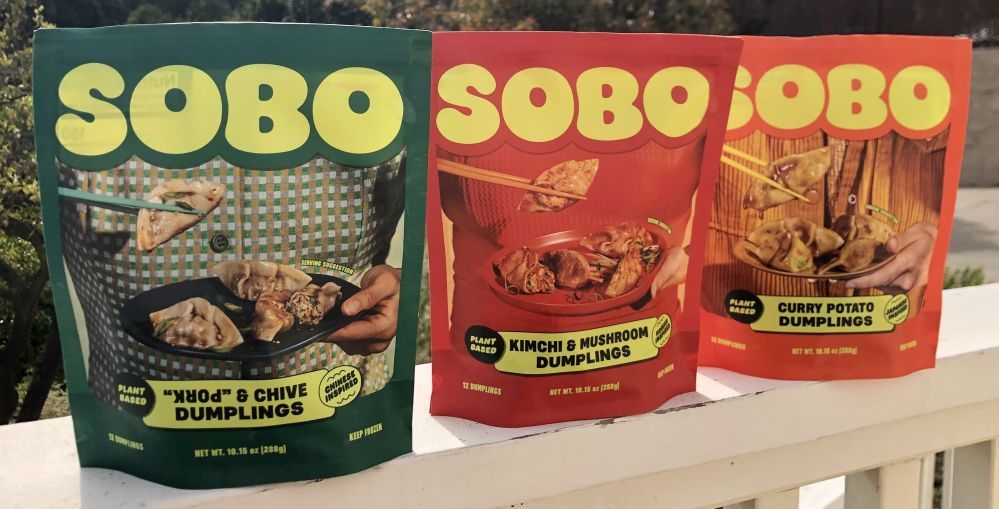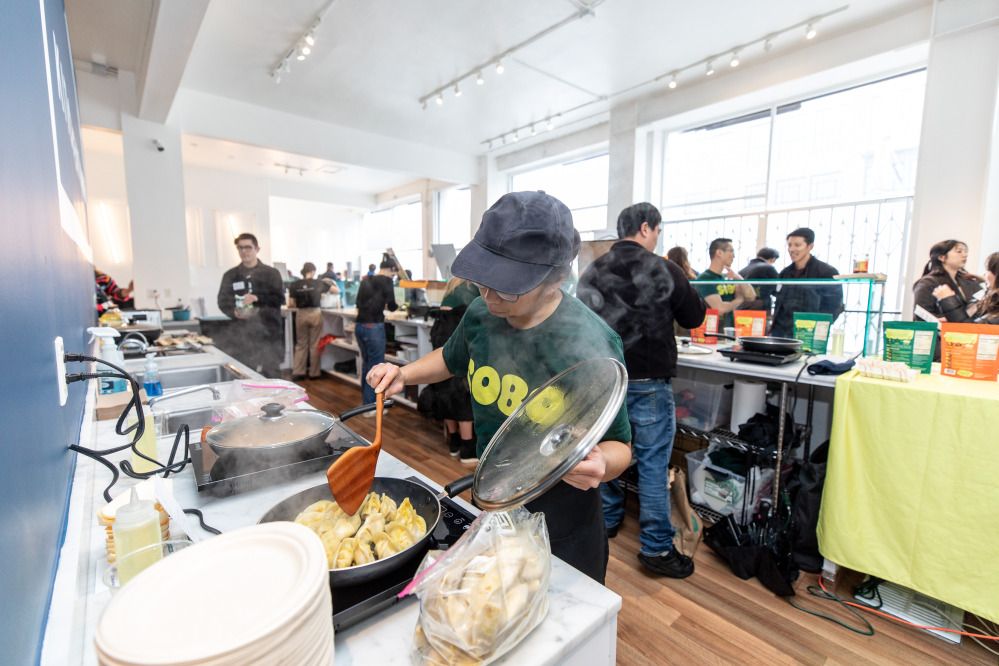“If you look in the Asian section of the frozen food aisle, it’s kind of a wasteland when it comes to better-for-you products,” observes Eric Wu, cofounder of Sobo Foods, a startup emerging from stealth with $1 million in funding. As for branding, he says: “It’s at best tone deaf, and at worst, reliant on borderline racist tropes.”
California-based Sobo Foods, he says, is on a mission is to reimagine Asian comfort food for a new generation of consumers.
The brainchild of Wu, who cofounded personalized nutritional supplements co Gainful in 2017 while still at college, and Adam Yee, alt protein entrepreneur and host of the high-profile My Food Job Rocks podcast, the plant-based brand is launching this week in the San Francisco Bay Area.
Its first product line, frozen dumplings, is manufactured at the KitchenTown food innovation hub in San Mateo, California. There are three flavors: Japanese-inspired curry potato, Chinese-inspired pork & chive, and Korean-inspired kimchi & mushroom.
Backed by $1 million from investors including Ryan Bethencourt and Mariliis Holm at Sustainable Food Ventures, Vega founder Charles Chang, and KitchenTown founder Rusty Schwartz, Sobo Foods “began raising a small friends & family round at the end of last year and found ourselves quickly oversubscribed,” Wu tells AFN.
“We opened it up a bit more broadly to angels and more recently brought on a single institutional investor, Montage Ventures.”
The origins story
“I first met Adam when I was at Gainful and Adam was at [alt meat startup] The Better Meat Co, which both got their start at KitchenTown,” recalls Wu.
“Adam was looking for what could be best-described as a food grade cement mixer to blend proteins, which we were also using at Gainful. We kept in touch over the years and when I told Gainful I was making the decision to move on to a new venture last year, I caught up with Adam and we started kicking around ideas.
“I’m still on the board and an advisor to Gainful,” says Wu, who noted that members of the Gainful leadership team including CEO Dean Kelly and cofounder and CTO Jahaan Ansari have put money into Sobo Foods.
“They’re all very supportive because they know this is deeply personal for me,” adds Wu, who has just moved to Oakland, California, from New York. Yee has been in South San Francisco since the end of 2022.
“Adam and I are both the children of immigrants—Chinese Americans— and we wanted to focus on the foods we grew up with that have a meaningful cultural heritage, but also reflect our values of using food as a tool for impacting climate. “ Hence the decision to focus on plant-based products, he says.
Alt protein: Beyond burgers, sausages, nuggets
Yee, former meat scientist at alt-protein company Motif FoodWorks and technical cofounder at The Better Meat Co, adds: “What frustrated me a bit about the food tech scene was that we were always focusing on burgers, sausages or chicken nuggets.
“Sobo Foods is a CPG brand that celebrates plant-based but we’re inspired by Asian cultures. So you see Chinese influences in the pork and chive dumpling; the Kimchi tofu dumpling with spices like Gochujang [popular in Korean cuisine]; and then our Japanese curry potato dumpling that is just vegetables.”
According to Yee: “The technology involves creating a plant-based gelatin substitute that when melted in an enclosed dough wrapper (via cooking), will make a plant-based dumpling juicier. This is because of the interactions between our plant-based matrix and our plant-based gelatin. As the plant-based gelatin melts, it will pool in the dumpling skin and hold onto its juiciness. It also gives a similar mouthfeel to pork gelatin.”
Wu adds: “We have some really interesting IP that we’ve already submitted a patent application for. So we have some defensible technology; but I hesitate to say we’re a ‘food technology’ brand. We’re making awesome Asian-inspired dumplings that contain delicious plant-based ingredients like mushrooms, tofu, and glass noodles.”

‘Tone deaf’ Asian branding
As to the basic rationale behind Sobo Foods, adds Wu, there’s white space in the US freezer aisle.
“If you look in the Asian section, it’s kind of a wasteland when it comes to better-for-you products, or the branding can be at best tone deaf, and at worst, rely on some borderline racist tropes.
“I can’t knock people trying to make a buck, but we would love to see something branded in a modern way that tells the current Asian American story in an authentic way without being high in sodium, fat and sugar with a ton of artificial colors, flavors and preservatives and chock-full of factory farmed meats.”
But isn’t starting a food business in the frozen aisle notoriously challenging given the high costs of distribution and the poor suitability for e-commerce, a launch channel for many food startups?
“Maybe we’re just masochists, given that Adam comes from high-value food tech and I’ve just come from a high-margin direct-to-consumer business selling products with a two-year shelf-life,” jokes Wu. “But it really excites us personally.”
Food is not software
So what’s the go-to-market strategy?
A measured and careful one, says Wu, who will be hand-delivering orders for free to customers in the Bay Area that text him this week.
He explains: “Despite being venture-backed, we’re going to take a slow and steady approach to growth. The focus in 2023 is to grow Sobo in the San Francisco Bay Area by serving our fans at local events, food festivals, and farmers markets. We’re also working on special collaborations with chefs, restaurants, and brands with a particular focus on folks who are telling unique stories about the Asian American experience. By the end of 2023, we may decide to bring Sobo to a few local, community-driven grocery stores.
“We have no intention of putting our foot too hard on the gas and trying to grow too quickly. A lot of alternative protein companies that have come up in the last few years have raised money as if they’re software companies. But I know firsthand that you can’t grow a CPG food company—even something direct to consumer like Gainful—in the same way that you can grow a software company.
“We want to take a grassroots approach because food is about stories, it’s about wanting to help communities and we want to do that in San Francisco first and foremost before we start thinking about going into grocery or online or anything beyond that.”

The target consumer
As for early adopters for Sobo Foods, says Wu, “I suspect initially we’ll have hardcore vegans that have been waiting for a delicious vegan dumpling. But then, there’s people like us, first and second generation Asian Americans for whom these flavors are super nostalgic. The people who will recognize them and say, Wow, that is my childhood. The people who grew up in suburban melting pot communities and had immigrant parents like us.”
Beyond that, he says, there is a new generation of consumers that have tried Asian-inspired food at restaurants or with friends and want something plant-based that’s more interesting than burgers, sausages and nuggets.
“We’re going to do a lot of iterating, which is another reason we’re staying local in 2023 so we can understand what kind of people gravitate toward the brand first and foremost.”

Source link
Author Elaine Watson






